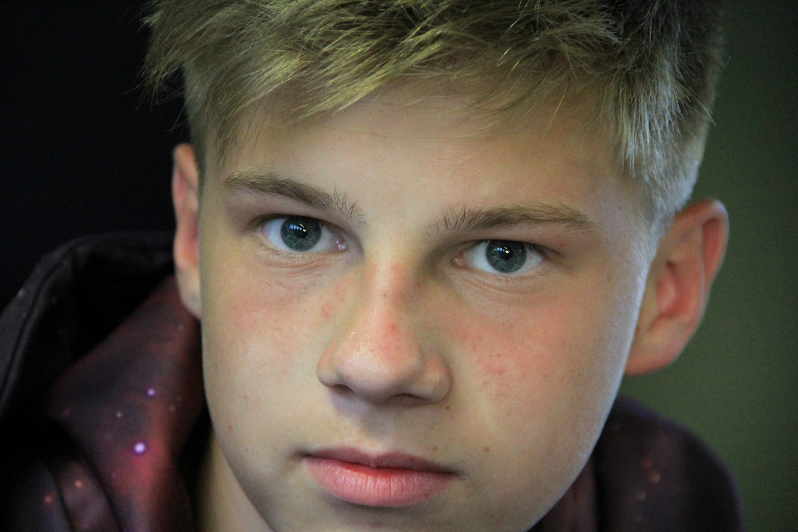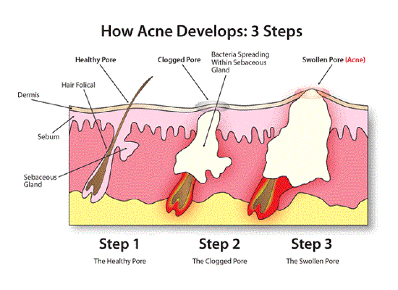
Zits! Let’s face it: If you have a teenage child, the chances are pretty good that they have at least some acne. In fact, almost 8 in 10 teens have acne — as do many adults! Acne is so common that it’s even considered a “normal” part of puberty and coming of age.
Acne is a condition of the skin that shows up as different kinds of bumps. These bumps are usually described as blackheads, whiteheads, pimples, or cysts. Most teens get acne because of the hormonal changes that come with puberty. If you had acne as a teen, it’s more likely that your teenage child will, too. The good news is that, for many people, acne goes away almost completely by the time they are out of their teens.
The type of acne that most teens get is called acne vulgaris (the meaning of “vulgaris” isn’t as bad as it sounds — it just means “of the common type”). It usually shows up on the face, neck, shoulders, upper back, and chest.
The hair follicles, or pores, in your skin contain sebaceous glands (also called “oil glands”). These glands make sebum, which is a fancy name for the oil that lubricates your hair and skin.
Most of the time, the sebaceous glands make just the right amount of sebum. As a teen’s body begins to mature and develop, though, the hormone changes can stimulate the sebaceous glands into making more sebum than your skin and hair can handle. If and when these glands become overactive, pores in their skin can become clogged if there is too much sebum and too many dead skin cells. Bacteria (especially a very common one called Propionibacterium acnes) can get trapped inside the pores and multiply, causing the swelling and redness we are all too familiar with.

If a pore gets clogged up and closes but bulges out from the skin, your teen will be left with a whitehead. If the pore gets clogged up but stays open, the top surface can darken and they’re left with a blackhead. Sometimes the side wall of the pore opens, allowing sebum, bacteria, and dead skin cells to make their way under their skin and they’re left with a small, red bump called a pimple (sometimes pimples have a pus-filled top from the body’s reaction to the bacterial infection). Clogged pores that open up very deep in the skin can cause nodules, which are infected lumps or cysts that are bigger than pimples and can be extremely painful. Occasionally, large cysts that seem like acne may be boils caused by a staph infection.
No! If they look in the mirror and see a pimple, they shouldn’t touch it, squeeze it, or pick at it — no matter how tempting it can be to try to get rid of a pimple! When they play around with pimples, they can cause even more inflammation by popping them or opening them up. Plus, the oil from their hands doesn’t help things. More important, though, picking at pimples can leave tiny, permanent scars on their face.
To help prevent the oil buildup that can contribute to acne, make sure they are washing their face at least once or twice a day with a mild soap and warm water. Have them clean their face as gently as they can, but make sure they do it thoroughly.
If they wear makeup or sunscreen, make sure it’s labeled “noncomedogenic” or “nonacnegenic.” This means it won’t clog their pores and contribute to their acne. And when they’re washing their face, be sure they take the time to remove all of their makeup so it doesn’t clog their pores.
Acne isn’t really helped by the sun. Although a tan can temporarily make acne appear less severe, it won’t help it go away permanently — and some people find that the oils their skin produces after being in the sun make their pimples worse.
If they use hair spray or gel, they should try to keep it away from their face — hair products can also clog pores. If they have long hair that goes over their face, make sure they wash it often enough to keep oil at bay. And if they have an after-school job that puts them in contact with oil — like in a fast-food restaurant or gas station, for example — be sure they wash their face well as soon as they get home. It also can help them to wash their face after they’ve been exercising or playing any sports.
It is important to note that acne can be caused by hereditary factors — normal hormones and such — and that your teenager can have the cleanest face in the world and still have very severe acne. Because of this, sometimes just cleaning well will not treat their acne. In fact, over cleansing can actually cause irritation. They shouldn’t scrub their face too hard — after all, acne can’t be scrubbed away and overly vigorous scrubbing may actually make it worse by irritating their skin.
Many over-the-counter ointments and creams containing salicylic acid or benzoyl peroxide are available to help prevent acne and clear it up at the same time. In fact, for teens with non-scarring acne, over-the-counter benzyl peroxide-based medications can be extremely effective. Benzyl peroxide can help prevent acne lesions, which, in turn, reduces scarring. Some of the lesions on the face that people believe to be scars are actually post-inflammatory pigment changes. These will eventually fade away. True scars do not completely go away on their own. Also please note that benzyl peroxide will not make an existing scar go away. To treat actual scars requires cosmetic surgery techniques, which is why it is very important to treat bad acne on the onset so the scars aren’t made. Preventing scarring is much easier than treating once it has occurred!
If the child has large, deep, acne lesions, or lesions that are causing scarring, or that don’t respond to over-the-counter benzyl peroxide preparations, they need to see a dermatologist. There are a number of prescription treatments available that are extremely effective for acne. They can experiment with these to see which helps. Be sure they follow the instructions exactly — they shouldn’t use more than they’re supposed to at one time (their skin may get too dried out and feel and look worse) and follow any label directions about allergy testing.
It’s a commonly held belief that many foods, such as chocolate, can exacerbate acne issues. While the science behind this issue is contentious, some people do find that they notice their breakouts get more severe when they eat too much of a certain food. This could be due, in part, to their individual body chemistry. If your teenager notices flare ups being caused by certain foods, it’s worth having them try to cut back on that food to see what happens.
Sometimes even though they wash properly and try cleansers and oil-free makeup, people get acne anyway — and this is totally normal. In fact, some girls who normally have a handle on their acne may find that it flares up really bad a few days before they get their period. This is called premenstrual acne, and typically 7 in 10 women get it from changes in hormones in the body.
Some teens who have acne can get help from their pediatrician or a dermatologist (a doctor who specializes in skin problems). Your pediatrician may treat your teen’s acne with prescription medicines. Depending on the person’s acne, this might mean using prescription creams that prevent pimples from forming, taking antibiotics to kill the bacteria that help create pimples, or if the acne is severe, taking stronger medicines such as isotretinoin — or even having minor surgery. Some girls find that birth control pills help to clear up their acne, as well.
If you have any questions about your child’s acne or skin problems, please call MacKoul Pediatrics at 239-573-2001 to set an appointment so your pediatrician can help you navigate your options when it comes to dealing with your teen’s acne.
MacKoul Pediatrics is an amazing local pediatrics office in Cape Coral, FL where caring, compassionate doctors and nurses work with you to keep your children as healthy as possible. MacKoul cares for children from birth to college age, from Cape Coral, Fort Myers, Naples, and beyond.
August 3, 2015

![[IMAGE]](http://static.mackoulpediatrics.com/images/858_ncqa_logo_centered.png)
 Zits! Let’s face it: If you have a teenage child, the chances are pretty good that they have at least some acne. In fact, almost 8 in 10 teens have acne — as do many adults! Acne is so common that it’s even considered a “normal” part of puberty and coming of age.
Zits! Let’s face it: If you have a teenage child, the chances are pretty good that they have at least some acne. In fact, almost 8 in 10 teens have acne — as do many adults! Acne is so common that it’s even considered a “normal” part of puberty and coming of age.
